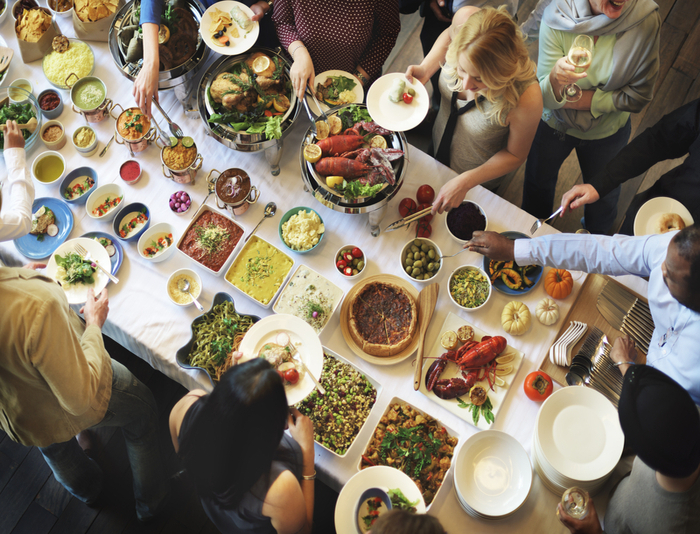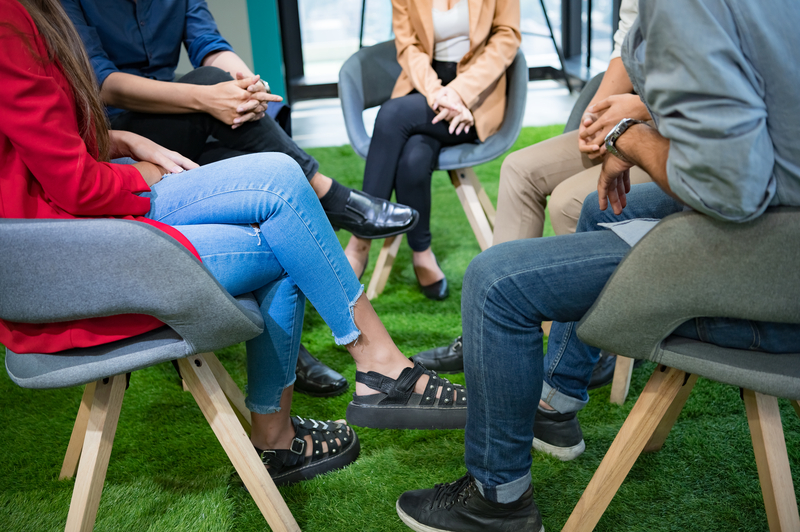- Calls to this hotline are currently being directed to Within Health, Fay or Eating Disorder Solutions
- Representatives are standing by 24/7 to help answer your questions
- All calls are confidential and HIPAA compliant
- There is no obligation or cost to call
- Eating Disorder Hope does not receive any commissions or fees dependent upon which provider you select
- Additional treatment providers are located on our directory or samhsa.gov
Food Anxiety and Social Events

Throughout human history, large meals have been an integral part of all kinds of occasions. And today, everything from birthday parties to holidays, weddings, date nights, and professional events may center around the idea of eating with others.
For many, these get-togethers mark a happy occasion. But for individuals dealing with food anxiety, these moments can be fraught with panic and emotional distress.
Body image issues, food aversion, or other food-related anxieties can make social gatherings a triggering and detrimental experience. But with the right kind of support, someone struggling with food anxiety can learn how to better handle—and possibly even enjoy—these situations.
What is Food Anxiety?
Food anxiety is not an official medical condition, but the term describes a type of distress concerning the effects of food on the body. Stress can manifest in many ways, including focusing on calories, weight gain, or being judged by others for what one is eating.
Some people with food anxiety also fear certain food textures and worry about possible allergic reactions or choking. However, these more specific fears are often connected to an eating disorder called avoidant/restrictive food intake disorder (ARFID).1
In general, anxiety disorders are also closely tied to eating disorders, with the conditions often developing together and playing off each other.2 Eventually, this can severely impact someone’s health or overall quality of life.
What Causes Food Anxiety?
Food anxiety is frequently a symptom—and even a driving factor—of eating disorders, but concerns about food or eating at social events can stem from a number of different places.
Worries over how one looks or the foods one eats can be tied to traits like perfectionism or issues like social anxiety or poor self-esteem.2,3 Being raised in a household where appearance was heavily emphasized may also impact how people feel about their bodies and, subsequently, the food they eat.3
Co-occurring mental health conditions can also influence someone’s likelihood of experiencing food anxiety. Some conditions that have been linked to food anxiety include:2
Individuals with sensory processing disorders can also struggle with food anxiety and social events. Smells, textures, and even colors can become overwhelming for these people and have a negative impact on the eating experience.1
Food Anxiety Symptoms
As food anxiety is not an official medical diagnosis, there are no “official” symptoms of this condition. But, in general, not eating enough food or only eating certain foods can lead to a number of issues, such as:5
- Anemia
- Muscle wasting and weakness
- Fatigue
- Cardiovascular complications
- Sleep complications
- Acid reflux, bloating, diarrhea, and other gastrointestinal issues
- Dehydration
- Unhealthy weight loss
- Malnutrition
The “anxiety” aspect of food anxiety can lead to—or be part of—many other concerns, including:6
- Trouble sleeping
- Inability to stay calm
- Cold, sweaty, or tingling feet or palms
- Dry mouth
- Dizziness or a sense of weakness
- Difficulty concentrating
When it comes to food anxiety and social events, there may be other signs and symptoms. Aside from avoiding food at these gatherings, someone may have difficulty talking or making eye contact, sweat, or feel dizzy or overwhelmed. Eventually, someone with severe food anxiety may self-isolate to avoid these get-togethers, which can have still other negative effects on emotional and mental health.
Find a Treatment Provider
Challenges of Social Events When Controlling Food Anxiety
Indeed, attending social events while living with food anxiety can present unique challenges. Some of the biggest concerns for many people with this condition include:3,4
- Lack of control: Dining out often involves losing one’s autonomy over food choices. They may not like what’s on the menu or question what the meals were made with. And when they’re invited to a potluck or private party, the array of unknown foods can further increase anxiety.
- Etiquette implications: A guest with food anxiety may worry about hurting the host’s feelings. In many cultures, declining the food a host provides is seen as rude, and worrying about this perception can increase the anxiety already experienced.
- Indecision: People with food anxiety may worry about eating something that might cause discomfort or anxiety. There may not be anything on the menu that looks good to them. This can lead to indecision, which can lead to further social anxiety.
- Physical symptoms: Food anxiety can cause a physical response such as nausea, vomiting, and stomach pain, which can be embarrassing or uncomfortable in social situations.

Tips for Socializing with Food Anxiety
Still, living with food anxiety doesn’t have to mean living without socialization. Indeed, humans are social creatures and often suffer from a lack of regular contact.
Some tips for dealing with food anxiety in social situations include:
- Talking to the host or event planner beforehand.
- Offering to bring an appetizer or something you are comfortable with eating.
- Bringing a hostess gift, such as flowers or a bottle of wine, to show appreciation and gratitude for the invitation.
- Looking at the menu beforehand.
- Ordering takeout before the event and trying the item in your home.
- Giving yourself space. Choose a seat at the end of the table and allow yourself to take a walk or get some air if needed.
Managing anxiety is an ongoing task, and it’s not easy. These tips may be able to help alleviate some situations, but if you or someone you know continues to struggle with food anxiety or other disordered eating behavior, you may want to seek out professional help.
Getting Help for Food Anxiety and Social Events
While there is no easy fix for dealing with food anxiety at social events, it is possible to work toward positive change.
Therapy
There is usually a root cause for the anxious response to certain foods. Talking to a mental health professional can help you identify the source of your anxiety and develop strategies for managing it. Looking for therapists with a relevant background in trauma, anxiety, or eating disorders can be particularly helpful.
Help From Loved Ones
You can also ask friends and family for help at social events. For example, bringing a support person with you when you dine out can help alleviate certain aspects of anxiety. You can also develop a signal to alert them to your state of mind and have them bring you outside or initiate another type of coping strategy.
Support Groups
Support groups may offer other forums for help. You can speak to those going through similar situations or share or work on techniques that can lower anxiety.Most importantly, try to remember that help is available. Anxiety may feel too powerful to beat, but what the mind creates, the mind can also overcome.
Resources
- Avoidant/Restrictive Food Intake Disorder (ARFID). (n.d.) Cleveland Clinic. Accessed February 2025.
- Levinson CA, Sala M, Murray S, Ma J, Rodebaugh TL, Lenze EJ. (2019). Diagnostic, clinical, and personality correlates of food anxiety during a food exposure in patients diagnosed with an eating disorder. Eating and Weight Disorders; 24(6):1079–1088.
- Primeau M. (2020, July). Body image: A better perspective. Stanford University. Accessed February 2025.
- Anxiety Disorders. (2022). Mayo Clinic. Accessed February 2025.
- Eating Disorders: What You Need to Know. (n.d.) National Institute of Mental Health. Accessed February 2025.
- Symptoms of anxiety and how to know when you need help. (2024, August 21). University of California Davis. Accessed February 2025.

The EatingDisorderHope.com editorial team comprises experienced writers, editors, and medical reviewers specializing in eating disorders, treatment, and mental and behavioral health.

